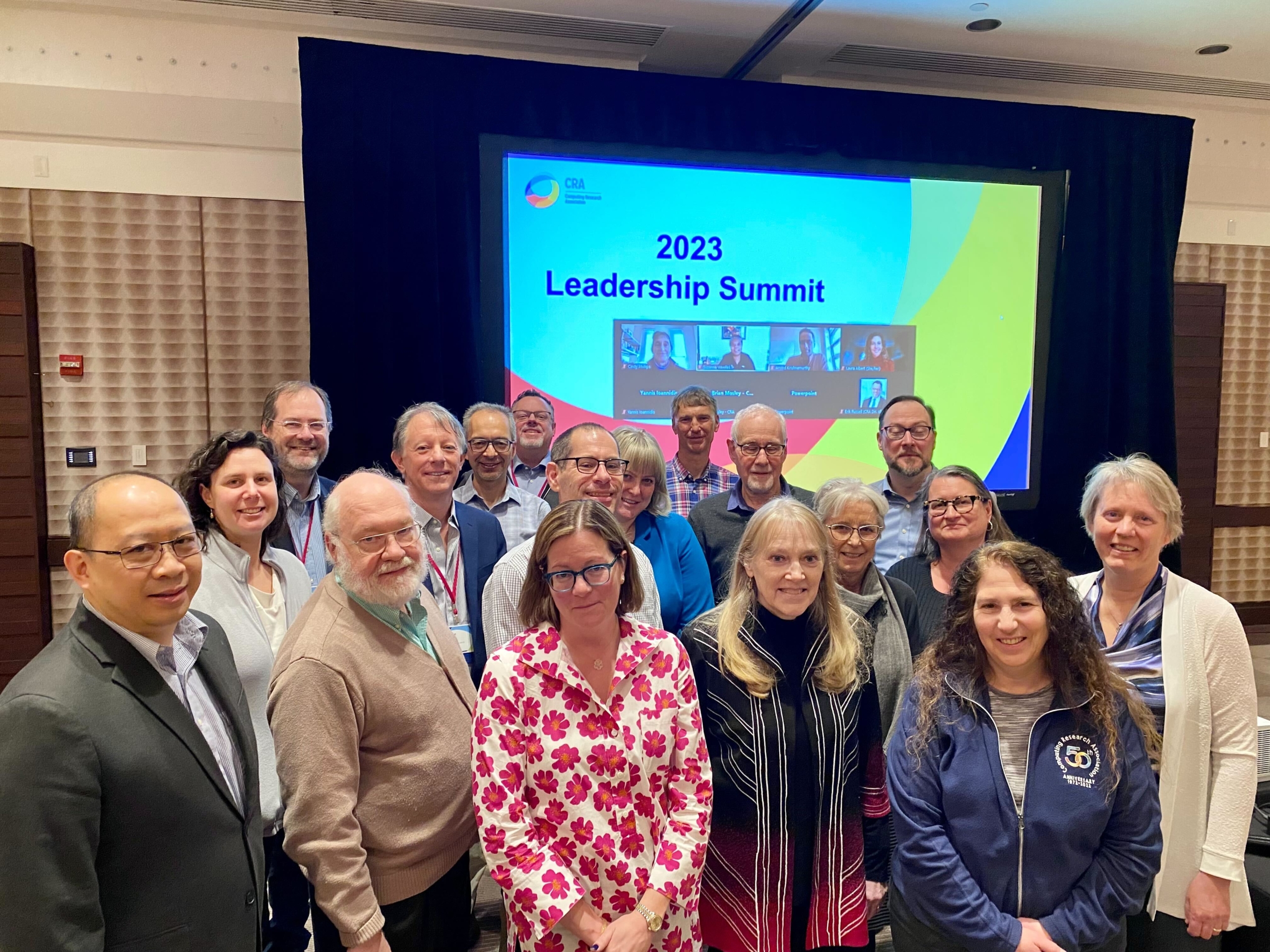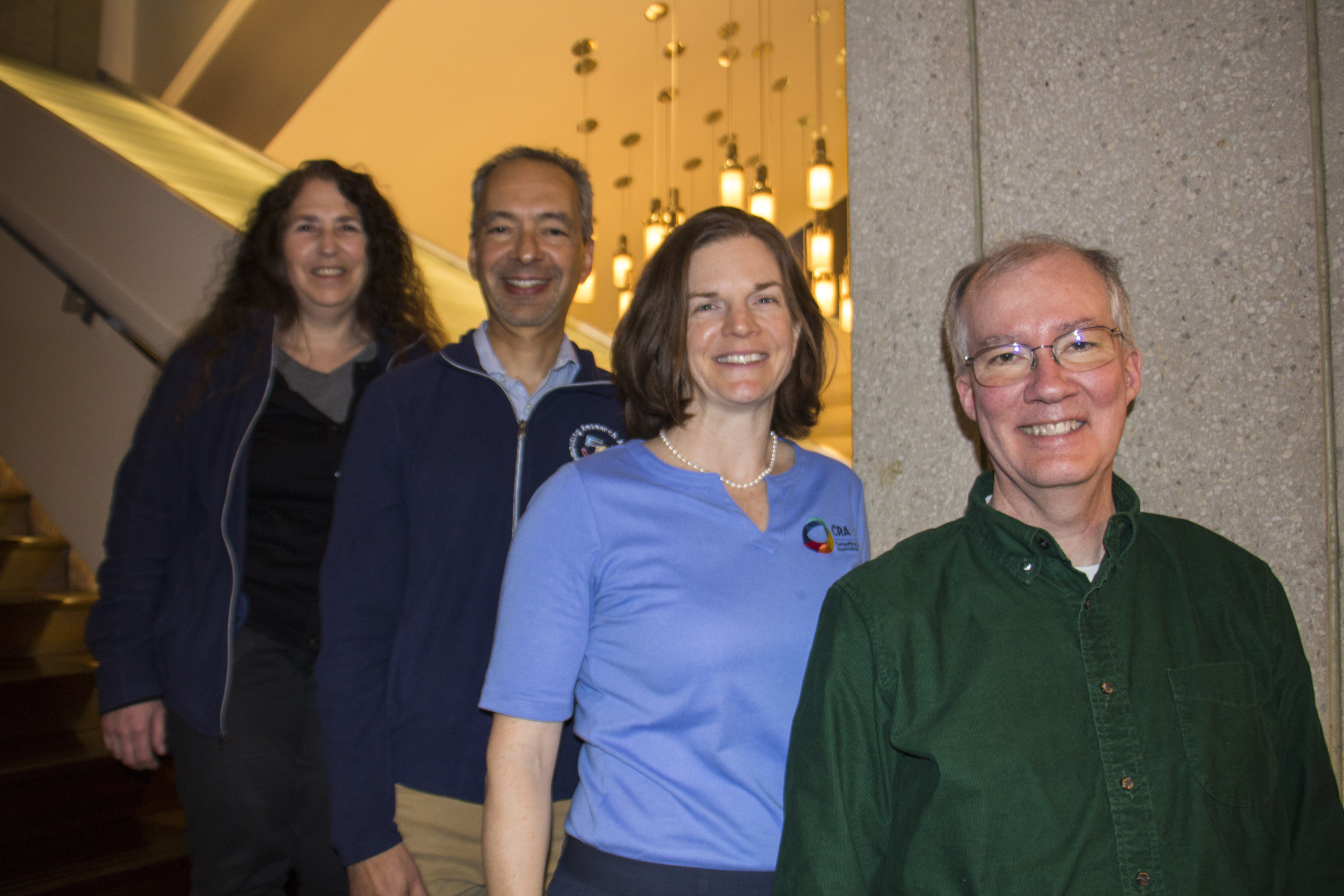CRA Update: Keeping you in the know – 2023 CRA Leadership Summit and Winter Board Meeting Recap
On February 23-24, 2023, CRA hosted its annual Leadership Summit for senior leadership of computing related professional societies as well as its winter Board meeting in Washington, DC. Below is a summary of the items discussed during the sessions. The next CRA Board of Directors meeting will be held July 13-14, 2023 in Portland, Oregon. If you have suggestions on agenda topics for our July 2023 CRA Board meeting (e.g., breakout room topics), please provide them here.

Leadership Summit Highlights
During the society roundtable session, each organization discussed current projects, future directions, and issues they are addressing this year. Common themes that arose were:
- Events: Many organizations are balancing virtual, hybrid, and in-person conferences as well as navigating between the opportunities of reaching larger audiences and finding a revenue model that will sustain conferences
- Research integrity: Several organizations are addressing increasing rates of misconduct in scientific publishing, as well as harassment and bullying
- Diversity, equity, and inclusion: DEI initiatives are ‘top of mind’ of many organizations
- Open access publishing: organizations are thinking about how this affects societies and their business models
- The National Academies CTSB is seeing a surge of interest in advancing AI in all fields and finding common themes across different scientific disciplines; conducting new study in ML in safety-critical systems; exploring the future of HPC for nuclear stockpile stewardship; and investigating interventions in K-12 education on quantum information science
- Connections: some organizations are wondering how to rebuild community connections since the pandemic, including re-engaging students
- Advocacy: some organizations are analyzing their portfolio of advocacy issues and where they can have the greatest impact.
- CRA also discussed engaging the global research community. CRA is interested in connecting with societies and organizations around the globe that have similar focus to CRA, to learn from them and support one another.
Rebecca Keiser, Chief of Research Security Strategy and Policy at NSF, gave a talk on Research Security and Responsible Internationalization. She reviewed the history of steps taken to strengthen U.S. research security, including the 2019 JASON report and NTSC Research Security Subcommittee, as well as the current status of mandates designed to optimize research security. She encouraged discussion and asked what her office could do to best aid researchers navigating this topic.
Alex Aiken, Co-Chair of the CRA Research Integrity Committee, shared updates on what the committee has been working on. There is concern within the research community that research integrity is being undermined by issues such as: falsification of results, harassment, gaming of review systems, reviewer cabals, and the role of ChatGPT and similar services. The group plans to prepare a best practices report by June 2023 with recommendations and other suggestions to mitigate threats.
Khan Vu, CEO and Executive Director of the Society of Asian Scientists and Engineers, gave a presentation on how Asians are underrepresented in STEM leadership and what society leadership can do to address this. Evidence shows American Asians do not have disinterest in leadership roles, but there are significant cultural issues at play. Leaders can encourage/invite Americans Asians to speak up during meetings, encourage/appoint them to visible leadership positions, mentor or have them mentored by culturally aware leaders, create a leadership pipeline and affinity groups, and support cultural and agile leadership programs.
Board Meeting Highlights
Current CRA Priorities
CRA Board Chair Nancy Amato kicked off the meeting by sharing top level priorities for CRA, including CRA governance, broadening engagement, diversity along many different aspects, and engaging with the global research community. CRA Executive Director Tracy Camp shared additional activities including: career engagement, working to make CRA events more sustainable, and expanding connections/partnerships.
 CRA Board Officers Elected
CRA Board Officers Elected
The CRA Board of Directors held elections for Board Officers to serve two-year terms beginning July 1, 2023. Nancy Amato (University of Illinois) was re-elected Chair; Ran Libeskind-Hadas (Claremont McKenna College) was elected Vice Chair; Katie Siek (Indiana University) was elected Secretary; and James Allan (UMass Amherst) was re-elected Treasurer.
CRA Budget Report
CRA Treasurer James Allan gave an overview of CRA’s financial picture for past, current, and upcoming fiscal years. The Board voted to approve the FY24 budget proposed and discussed whether we need to increase reserve funds.
Awards Selected
The Board selected Charles L. Isbell, Dean and John P. Imlay, Jr. Chair of the Georgia Institute of Technology College of Computing, as the recipient of the 2023 CRA A. Nico Habermann Award, in recognition of his substantial impact on improving diversity, equity, and inclusion in the computing community. The Board also selected Lynne Parker, Associate Vice Chancellor and Director of the AI Tennessee Initiative at the University of Tennessee, as the recipient of the 2023 CRA Distinguished Service Award for her unparalleled impact on the computing research community.
Government Affairs
During the Government Affairs Update, CRA Senior Policy Analyst Brian Mosley provided a review of the CHIPS and Science Act and detailed specifics of the FY23 Omnibus for several research agencies, with a special focus on the National Science Foundation (NSF) and the large increase it received. Upcoming issues and concerns included legislative gridlock in Congress, a renewed focus on the nation’s policies toward China, and research security policies proposed from the Executive Branch research agencies. The committee is organizing the Leadership in Science Policy Institute (LISPI) to be held in DC in November. LISPI is a joint effort with the CCC that develops next-generation leaders in the computing research community.
Stephanie Forrest, Chair of the Government Affairs Committee, highlighted issues the committee is focusing on this year, including how to pursue legislative and policy matters around socially responsible computing, the complexities of the research security topic, and potential regulations around AI policy. Board members were asked about additional topics the committee should look into, and the CRA Board approved the proposed committee bylaws.
The View from NSF
Margaret Martonosi, Assistant Director for NSF CISE, discussed CISE organization, core programs, and how CISE advances national and societal priorities through programmatic and policy efforts. She shared what NSF sees as priorities coming out of the CHIPS and Science Act, encouraged infrastructure proposal submissions, and detailed the progress of the CSGrad4US program, which CRA provides support for.
Reports from CRA Board Committees and Working Groups
The CRA Governance Working Group is working on updating CRA bylaws and exploring recommendations for more inclusive governance.
The Socially Responsible Computing Working Group has formed three subgroups: (1) Ethics curricula, (2) Best practices for conferences with respect to socially responsible computing, and (3) Computing, climate, and sustainability. Each of these three subgroups is tasked with submitting a report with recommendations to the CRA Executive Committee in June 2023.
The Misconduct Issues Working Group is discussing whether CRA should become the accountability group for these issues. They are also considering developing principles for the community in addition to the punitive-oriented code of conduct.
The CRA Career Engagement Group is considering how CRA can be engaged in the different points of a computing researcher’s career, from undergraduate research through graduate school and beyond.
The Research Integrity Working Group is addressing concerns within the research community that research integrity is being undermined and plans to prepare a best practices report in June 2023 with recommendations and other suggestions to mitigate threats. (See additional details in the Leadership Summit section above.)
CRA Board Member Mary Hall is leading the CRA History Project efforts. In recognition of CRA’s 50th anniversary last year, this project seeks to document the history of CRA. In June, CRA will host a panel at FCRC ‘23 reflecting on 50 Years of Computing Research and Future Prospects. She is developing a plan to archive past CRN newsletters and exploring additional activities such as collecting oral histories, preparing an article on evolution of CRA, and writing additional articles on the history of the creation of each subcommittee and impact stories.
The inaugural CRA Leadership Academy, a leadership training workshop for mid-career computing researchers, is being planned for May 22-23, 2023. The organizers are directing outreach to increase the diversity of participants.
Breakout Discussions
CRA organized three breakout discussion groups to collect input from CRA Board members on high priority topics. Additional details on each session are below.
1. Engaging Minority Serving Institutions (MSIs)
The CRA Board discussed CRA’s engagement level with MSIs in a session led by CRA Board member Raquel Hill and CRA Board Chair Nancy Amato. The session focused on the importance of establishing relationships with faculty at MSIs, and gaining a true understanding of the needs and desires of faculty at MSIs which can vary greatly. One area for growth moving forward is to identify and work towards models of sustained engagement.
2. Industry
Computing Research Association-Industry (CRA-I) received feedback from the CRA Board on a number of new activities for 2023. It is clear that CRA-I activities are helping build bridges between Industry, Academia, and Government through roundtables, workshops, etc., as well as connecting the different sectors and bolstering research. The Board recommended that CRA-I continue those activities while also working to engage more underrepresented populations and potentially catalyzing some public/private partnerships programs for the community that engages students and brings them into industry research early on in their college career. CRA-I with access to all of CRA’s multiple committee resources is well positioned to develop such an initiative for the community.
3. Communications
The CRA Board was asked to draw from experiences with their organizations to brainstorm ideas on how CRA could improve its communications and outreach. Below is a brief summary of thoughts shared:
- One goal of communications is to make sure people know about CRA and its activities.
- Often CRA communications get funneled through one point of contact, and this can cause information to get bottlenecked, and not distributed to the right groups of people that can take action. There was support to develop communications for individuals designated as “CRA ambassadors” and instruct them on which group each piece is for so they can distribute appropriately.
- There was support for increased measurement and evaluation of communication initiatives, better tracking of each campaign element and if it accomplished its purpose, as well as an increased focus on storytelling, and convening a regular meeting of communications directors of partner societies.
- CRA could better capitalize on items of high interest, such as pieces of the Taulbee survey and information gathered from the CRA History Project.
Best Practice Documents
CRA is considering updating the best practices document, “Incentivizing Quality and Impact: Evaluating Scholarship, Tenure, and Promotion” (Feb. 2015). There is an opportunity to address issues of quantity versus quality of publications in the next version.
There is also interest in creating a new best practices document on “Multi-disciplinary Research: How to do this well” to address how to support junior faculty members and give credit for this kind of work.


